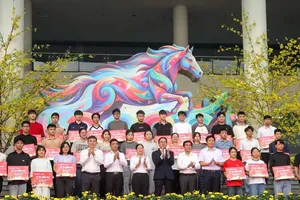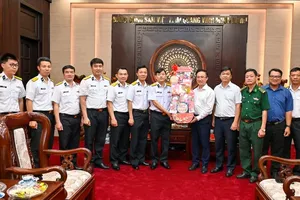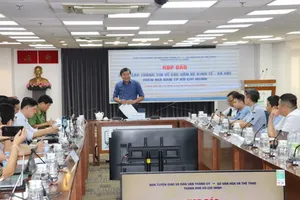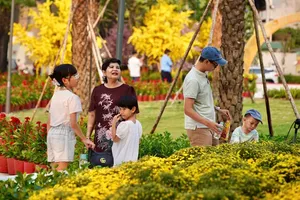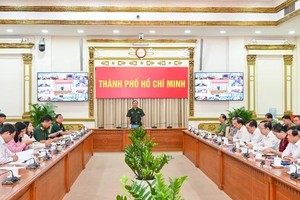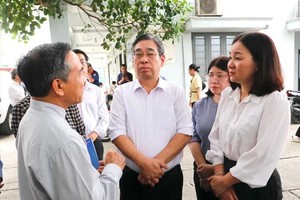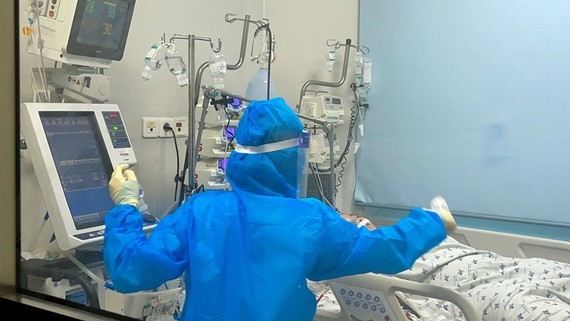
Treating a pediatric Covid patient in Binh Chanh District, HCMC. (Photo: SGGP)
The Party Committee and government of HCMC at the start of August 2021 decided to prioritize taking care of Covid-19 patients at home and developing effective treatment strategies over tallying new cases, said Phan Van Mai, Member of the Party Central Committee, Standing Deputy Secretary of the HCMC Party Committee and Chairman of the city People's Committee.
Thanks to the models being implemented, the fatality rate in HCMC since September 2021 has dropped to under 200 per day and continuing to go down. At the same time, there have been no more patients passing away at their own house since then.
Mobile units and stay-at-home patient model
As of the end of September 2021, there were 200 Covid patients being monitored at home and 100 in common quarantine areas across Ward 14 of Go Vap, tended to by two mobile medical units who also supply them with prescription drugs.
Meanwhile in District 10 and District 8, the outpatient model which includes a counseling team and a quick response team also saw initial success when piloted. The counseling team is in charge of checking on patients daily and keeping their spirits up, immediately notifying the quick response team in case of emergencies. At one time, there were 131 counseling teams, each in charge of 60 patients remotely, said the person in charge Assoc. Prof. Dr. Vuong Thi Ngoc Lan of the University of Medicine and Pharmacy at HCMC.
The number of Covid-19 outpatients as of September 23 was 32,744, which went down to 17,839 as of October 11. HCMC has set up over 500 mobile medical units, 312 quick response teams, along with 1,500 expert medical consultants to ensure safety for the outpatients.
Currently, prescription drugs for Covid outpatient are categorized as package A, B, and C. The Department of Health and the Ministry of Health have distributed 150,000 A and B packages as well as 16,000 C packages respectively.
Among medicine packages supplied to Covid-19 outpatients, package A consists of common drugs including antipyretic and vitamins enough for 7 days. Package B includes anti-inflammatory drugs containing corticosteroids and anticoagulants enough for 3 days. Package C consists solely of Molnupiravir, which is an antiviral drug being experimented as part of the Ministry of Health’s research. It has been clinically tested at Thong Nhat hospital with positive results. Patients must sign a waiver before being prescribed this package.
Among medicine packages supplied to Covid-19 outpatients, package A consists of common drugs including antipyretic and vitamins enough for 7 days. Package B includes anti-inflammatory drugs containing corticosteroids and anticoagulants enough for 3 days. Package C consists solely of Molnupiravir, which is an antiviral drug being experimented as part of the Ministry of Health’s research. It has been clinically tested at Thong Nhat hospital with positive results. Patients must sign a waiver before being prescribed this package.
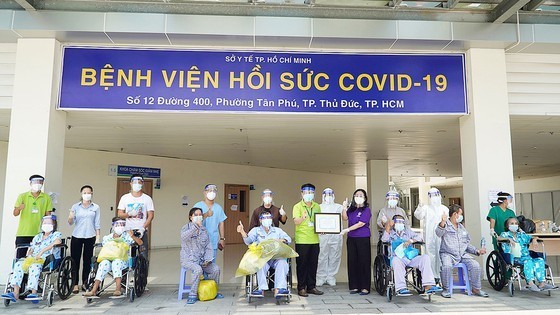 Previously critically ill Covid patients being discharged. (Photo: SGGP)
Previously critically ill Covid patients being discharged. (Photo: SGGP)
Tier division saves lives
HCMC in September managed to organize 90 treatment facilities for over 40,500 Covid-19 patients categorized into three tiers based on severity. The model has helped medical staff regulate resources effectively in the long run.
Specifically, the first and second tiers consist of 12 and 68 hospitals respectively. The third comprises 10 fully equipped facilities with a capacity of 3,268 beds for critically ill patients.
Most notably, a field hospital in Tan Binh which integrates all three tiers has seen a drop in mortality rate from 5 percent to under 3 percent across the district. It was put into operation on August 18 with 1,000 beds, among which 50 are reserved for intensive care and 150 for critical patients.
Meanwhile, hospitals in the second tier always maintain communications with facilities of the third tier, ready to transfer patients whose condition might turn severe drastically, giving them the best chance of survival.
